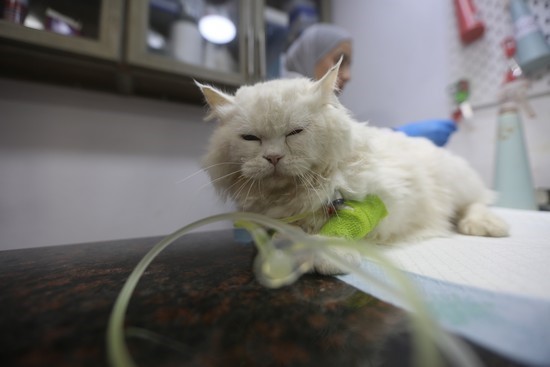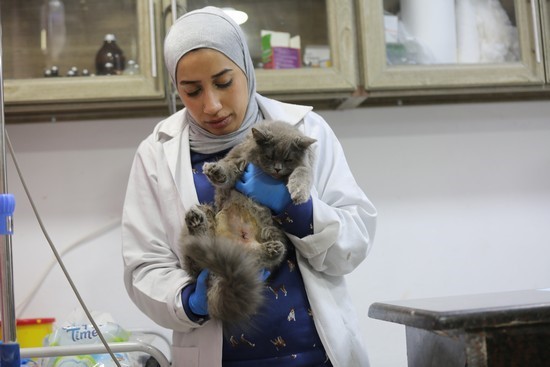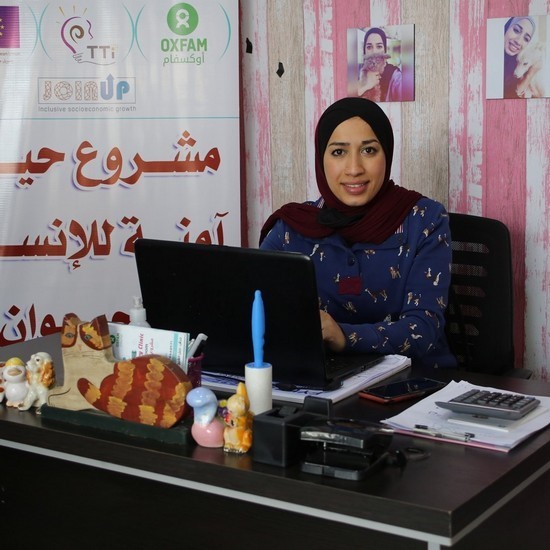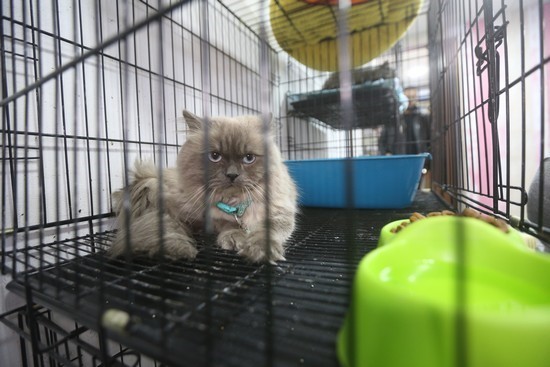Shooting of stray dogs makes the news every once in a while,
pointing to a possible problem in Jordan.
The Four Paws veterinary clinic that
works around the clock in Jerash tries to make a more peaceful co-existence
between free-roaming animals and citizens possible.
اضافة اعلان
The clinic’s founder and veterinarian Yasmeen Al-Otoom
remembers one Friday pre-dawn shot near her house in a rural area in Jerash.
“Perhaps a police chase,” she thought. It never occurred to her that a stray
dog had been viciously shot by a municipality sniper.
 Four Paws operates veterinary services such as periodic care, including vaccinations, diagnosing illnesses, treating wounds, prescribing medication, carrying out tests and ultrasound scans, and consulting pet owners about preventive healthcare. (Photos: Ameer Khalifeh/Jordan News)
Four Paws operates veterinary services such as periodic care, including vaccinations, diagnosing illnesses, treating wounds, prescribing medication, carrying out tests and ultrasound scans, and consulting pet owners about preventive healthcare. (Photos: Ameer Khalifeh/Jordan News)
“The dog did not die immediately, I listened to his
half-dead, half-alive, heart-wrenching squeals of pain for an hour until he
died. I did not sleep a wink after that and to this day, the sounds of the
dying dog echoes in my ears. To take a life, and in such a cruel way, is simply
unimaginable and inhumane, and it does not solve the problem. Then, I took it
upon myself to lend a hand to those animals so that such a scenario would not
occur again,” Otoom told
Jordan News.
After Otoom got her doctor of veterinary medicine degree,
she started a mobile veterinary clinic which made her realize how many people
in Jerash love animals and have pets. In 2020, she, with the help and support
of her spouse, launched her private vet practice, Four Paws, with two special
programs aimed at rescuing as many stray animals as possible.
 Four Paws operates veterinary services such as periodic care, including vaccinations, diagnosing illnesses, treating wounds, prescribing medication, carrying out tests and ultrasound scans, and consulting pet owners about preventive healthcare. (Photos: Ameer Khalifeh/Jordan News)
Four Paws operates veterinary services such as periodic care, including vaccinations, diagnosing illnesses, treating wounds, prescribing medication, carrying out tests and ultrasound scans, and consulting pet owners about preventive healthcare. (Photos: Ameer Khalifeh/Jordan News)
One program, called “Safe life for humans and strays”,
entails raising the Jerash residents’ awareness, in cooperation with Greater
Jerash Municipality. Attendees were educated about stray animals, the
importance of their presence in preserving ecological balance, and the acts
that exacerbate hostility, as well as the sensible ways of dealing with them
without antagonizing the animals who tend to protect and sustain themselves.
At our clinic, we spay, neuter, and vaccinate stray animals for free, which is especially important for reducing their population number and preventing the spread of canine diseases to humans.
The “Animal birth control — ABC program” strives to humanely
control the number of stray dogs through the application of sterilization and
vaccination, so fewer stray dogs repopulate and spread diseases over time,
effectively solving the inconvenience stray animals cause in residential areas.
“At our clinic, we spay, neuter, and vaccinate stray animals
for free, which is especially important for reducing their population number
and preventing the spread of canine diseases to humans. We mark those animals
yellow around their ears and then release back into the wilderness. Residents
would know what to anticipate if they came across one of these if they are
marked. The procedure is known as a TNR (trap-neuter-return) and is the most
sustainable and ethical solutions to this problem,” Otoom said.
 Four Paws operates veterinary services such as periodic care, including vaccinations, diagnosing illnesses, treating wounds, prescribing medication, carrying out tests and ultrasound scans, and consulting pet owners about preventive healthcare. (Photos: Ameer Khalifeh/Jordan News)
Four Paws operates veterinary services such as periodic care, including vaccinations, diagnosing illnesses, treating wounds, prescribing medication, carrying out tests and ultrasound scans, and consulting pet owners about preventive healthcare. (Photos: Ameer Khalifeh/Jordan News)
Specifically, rescuing and vaccinating stray dogs can
minimize the number of people who catch and die from rabies — which is spread
mostly through dog bites. It can also reduce the transmission of other canine
diseases, by reducing the prevalence of dog-related injuries.
Disease prevention is cost-effective, as it is less expensive than post-exposure
treatment.
Four Paws operates veterinary services such as periodic
care, including vaccinations, diagnosing illnesses, treating wounds,
prescribing medication, carrying out tests and ultrasound scans, and consulting
pet owners about preventive healthcare.
“None of this work would have been possible without the fund
I received through Oxfam’s project JOin UP, funded by the EU. It enabled me
start my clinic, increase the number of equipment and devices in the clinic.
Next, we are introducing a new device that is not available anywhere in Jerash
except at Four Paws. With Oxfam’s support, more than 500 dogs has been
sterilized in the five most affected areas in Jerash,” Otoom said.
 Four Paws operates veterinary services such as periodic care, including vaccinations, diagnosing illnesses, treating wounds, prescribing medication, carrying out tests and ultrasound scans, and consulting pet owners about preventive healthcare. (Photos: Ameer Khalifeh/Jordan News)
Four Paws operates veterinary services such as periodic care, including vaccinations, diagnosing illnesses, treating wounds, prescribing medication, carrying out tests and ultrasound scans, and consulting pet owners about preventive healthcare. (Photos: Ameer Khalifeh/Jordan News)
Working in a veterinary clinic comes with its share of
difficulties, but the rewards far outweigh the drawbacks. Despite the
discouragement she experienced because the job has a reputation for being
physically demanding and emotionally draining, she remained committed to
finishing her degree, opening her clinic, and succeeding in her field.
Working with animals that are frightened or in pain does not
come easy. It takes patience and a warm, welcoming, atmosphere.
The clinic also helped several animal lovers adopt animals,
giving them a home.
Otoom aspires to implement her programs in all governorates
of Jordan. One day she hopes Four Paws will evolve from a clinic to a
multi-branch center, lending a hand to overlooked creatures.
Read more Lifestyle






